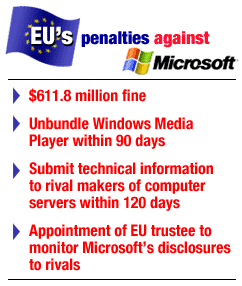
NEW YORK (CNN/Money) -
The EU accomplished something Wednesday that the U.S. government failed to do in 2001: it issued a meaningful punishment to Microsoft.
Sadly, it only took a few hours after the European Commission, the EU's antitrust arm, announced its sanctions before a prominent U.S politician began whining about how mean those big, bad, bureaucratic bullies from Brussels are.
"I now fear that the U.S. and the EU are heading toward a new trade war -- and that the Commission's ruling against Microsoft is the first shot," said U.S. Senate Majority Leader Bill Frist, a Republican from Tennessee, in a written statement Wednesday.
Frist went on to play the jobs card, asserting that the EU's ruling "threatens the vitality of America's IT industry" and that the EU showed "complete indifference to the negative impact of its ruling on American jobs, American consumers, and the U.S. economy."
The U.S. Department of Justice weighed in with a worry about the ruling's effect on innovation: "sound antitrust policy must avoid chilling innovation and competition even by 'dominant' companies," its statement read.
Such grandstanding is not surprising, but also is misleading.
End of innovation? Please
It's tough to see how the EU's ruling -- which could thwart Microsoft's ability to bundle new products into Windows -- would slow innovation.
| More about Microsoft
|

|
|
|
|
Let's flash forward a few years. By 2006 or 2007, Microsoft should be coming out with its next version of Windows, Longhorn. And it is widely believed that one of Longhorn's "killer apps" will be a new search engine.
But if Microsoft comes to dominate search in the same manner (i.e. bundling) that it has other areas of tech, then couldn't that possibly marginalize Google and Yahoo! (YHOO: Research, Estimates), two highly successful and innovative U.S. tech companies?
In turn, if Microsoft no longer can rely on bundling, isn't it reasonable to argue that Microsoft would need to work harder in order to build a product that's truly better than the competition? If anything, Microsoft would need to be more innovative, not less.
Jobs: Several U.S. companies could benefit
As for Frist's claims that the ruling could negatively impact U.S. jobs, let's examine the facts further. Forcing Microsoft to sell a version of Windows without its multimedia player bundled into it could be good news for Real Networks (RNWK: Research, Estimates) and Apple (AAPL: Research, Estimates). Last I checked, Real Networks is based in Seattle and Apple is headquartered in Cupertino, Calif.

The EU also told Microsoft that it must share more code with competitors that make software for servers. That could be a boost for Sun Microsystems (SUNW: Research, Estimates), perhaps the most vocal Microsoft critic. By the way, Sun is based in Santa Clara, Calif.
Several other U.S. companies, ranging from Linux software sellers Red Hat (RHAT: Research, Estimates) and Novell (NOVL: Research, Estimates) to anti-virus software firms Symantec (SYMC: Research, Estimates) and Network Associates (NET: Research, Estimates) also may benefit from the decision. Why shouldn't the future health of these techs matter?
Some of Frist's other comments were quite the doozy as well, such as this one. The ruling "also requires Microsoft to sell a version of Windows without multimedia functionality - i.e., one that cannot play audio or video."
| Recently in Tech Biz
|

|
|
|
|
That's simply inaccurate. The EU's ruling does not mean that Windows won't have multimedia functionality. It means that Windows won't have Windows Media Player built in to it. Consumers would be able to still use Real's RealPlayer, Apple's Quicktime...or even download Windows Media Player from Microsoft's Web site if they so desired.
Finally, Frist had this to say about Microsoft's fine. "As a result, money that rightfully belongs to Microsoft shareholders will instead be filling the coffers administered by Commission bureaucrats."
Are you kidding me? A more than $610 million fine to a company with nearly $53 billion in cash doesn't even register as a slap on the wrist. It's more like a love tap.
And even if Microsoft were fined the maximum penalty, which would have amounted to over $3 billion, it would still have plenty left over to use to increase its dividend, buy back more shares, make acquisitions and invest heavily in R&D.
This ruling may in fact set a precedent that changes the way Microsoft does business in the future. Frist is right about that. But it does not signal that the end is nigh for the U.S. tech industry.
Sign up to receive the Tech Investor column by e-mail.
Plus, see more tech commentary and get the latest tech news.

|

